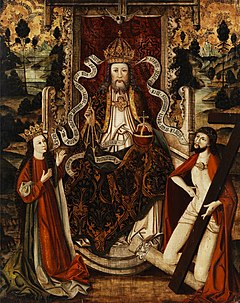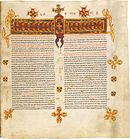Kingdom of God (Christianity)

The Kingdom of God (and its related form
The New Testament is written against the backdrop of
Christian interpretations or usage of the term "kingdom of God[9]" regularly make use of this historical framework and are often consistent with the Jewish hope of a Messiah, the person, and ministry of Jesus Christ, his death and resurrection, his return, and the rise of the Church in history. A question characteristic to the central theme of most interpretations is whether the "kingdom of God" has been instituted because of the appearance of Jesus Christ or whether it is yet to be instituted; whether this kingdom is present, future or is omnipresent simultaneously in both the present and future existence.
The term "kingdom of God" has been used to mean Christian lifestyle, a method of world evangelization, the rediscovery of
Etymology

The word Kingdom (in Greek: βασιλεία basileíā) appears 162 times in the New Testament and most of these uses relate to either basileíā toû Theoû (βασιλεία τοῦ Θεοῦ) i.e. the Kingdom of God or to basileíā tō̂n Ouranō̂n (βασιλεία τῶν Οὐρανῶν) i.e. Kingdom of Heaven in the Synoptic Gospels.[13] Kingdom of God is translated to Latin as Regnum Dei and the Kingdom of Heaven as Regnum caelorum.[14] Kingdom of Heaven (Basileíā tō̂n Ouranō̂n) appears 32 times in the Gospel of Matthew and nowhere else in the New Testament.[15] Matthew also uses the term the Kingdom of God (Basileíā toû Theoû) in a handful of cases, but in these cases, it may be difficult to distinguish his usage from the Kingdom of Heaven (Basileíā tō̂n Ouranō̂n).[15]
There is general agreement among scholars that the term used by Jesus himself would have been "Kingdom of God".
Kingship and kingdom
The Christian characterization of the relationship between God and humanity involves the notion of the "Kingship of God", whose origins go back to the Old Testament, and may be seen as a consequence of the creation of the world by God.[3][4] The "enthronement psalms" (Psalms 45, 93, 96,
The kingdom of God is first introduced in 1 Chronicles 28:5 [1], then in 2 Chronicles 13:8 [2], and Daniel 2:44, where the prophet Daniel foretells a coming kingdom that would begin during the days of the Roman Empire (Daniel 2:44).[19] The term "Kingdom of God" does not appear in the Old Testament, although "his Kingdom" and "your Kingdom" are used in some cases when referring to God.[20] However, the Kingdom of God (the Matthean equivalent being "Kingdom of Heaven") is a prominent phrase in the Synoptic Gospels and there is near-unanimous agreement among scholars that it represents a key element of the teachings of Jesus.[4][10]
Historically, the Church Fathers presented three separate interpretations of the Kingdom of God: the first (by Origen in the 3rd century) was that Jesus himself represents the Kingdom.[22][23] The second interpretation (also by Origen) is that the Kingdom represents the hearts and minds of the faithful captured by the love of God and the pursuit of Christian teachings.[22][24] The third interpretation (influenced by Origen but brought forth by Eusebius in the 4th century) is that the Kingdom represents the Christian Church composed of the faithful.[22][24]
Over the centuries a wide range of theological interpretations for the term Kingdom of God have appeared.
R. T. France has pointed out that while the concept of "Kingdom of God" has an intuitive meaning to lay Christians, there is hardly any agreement among theologians about its meaning in the New Testament.[10] Some scholars see it as a Christian lifestyle, some as a method of world evangelization, some as the rediscovery of charismatic gifts, others relate it to no present or future situation, but the world to come.[10] France states that the phrase the Kingdom of God is often interpreted in many ways to fit the theological agenda of those interpreting it.[10]
Eschatology

Interpretations of the term Kingdom of God have given rise to wide-ranging
By the middle of the 20th century, realized eschatology, which viewed the Kingdom as non-apocalyptic but as the manifestation of divine sovereignty over the world (realized by the ministry of Jesus), had gathered a scholarly following.[11] In this view the Kingdom is held to be available in the present.[12] The competing approach of inaugurated eschatology was later introduced as the "already and not yet" interpretation.[11] In this view the Kingdom has already started, but awaits full disclosure at a future point.[12] These diverging interpretations have since given rise to a good number of variants, with various scholars proposing new eschatological models that borrow elements from these.[11][12]
Judgment
This section may contain material not related to the topic of the article. (March 2017) ) |
Denominational variations
Given no general agreement on the interpretation of the term Kingdom of God, significant diversity exists in the way
Thus the denominational attempt at incorporating the ideals expressed in the
See also
References
- ^ ISBN 0684148897pp. 5-191 [I, "Nothing Matters but the Kingdom of God," ch. 1-10]
- ^ ISBN 080282501Xpp. 101–103
- ^ ISBN 0865543739p. 490
- ^ ISBN 0830814515pp. 478–479
- ^ ISBN 0801022509pp. 391–392
- ^ ISBN 0567084663pp. 390–391
- ^ Parable of the Mustard Seed"Parable of the Mustard Seed", Wikipedia, 2020-09-07, retrieved 2020-09-08
- ISBN 978-0-8028-3512-3.
- ^ "Kingdom of God". Lord Message.
- ^ ISBN 1573832448pp. 1–3
- ^ ISBN 0802826806pp. 77–79
- ^ ISBN 9004111425pp. 255–257
- ISBN 0802847552p. 473
- ISBN 0813206677p. 176
- ^ ISBN 0801026849Baker Academic. p. 37
- ISBN 0801026849p. 41
- ISBN 080282501Xp. 480
- ISBN 0860120066p. 1351
- ^ Schoenherr, Matthew (2022-01-04). "Kingdom of God Delayed? Parable of the Ten Minas (Nobleman)". Levaire. Retrieved 2022-02-03.
- ISBN 0801026946p. 420
- ISBN 978-0-8146-5803-1p. 248
- ^ ISBN 1931018464pp. 35–36
- ^ The Encyclopedia of Eastern Orthodox Christianity by
John Anthony McGuckin (Editor) 2010 ISBN 978-1-4443-9254-8John Wiley p. 439
- ^ ISBN 0860120066p. 1354
- ^ Vatican website Dominus Iesus, item 5
- ISBN 0801026512p. 197
- ^ ISBN 0521007208p. 246
- ISBN 0802806805pp. 55–57
- ^ a b The Oxford Companion to the Bible by Bruce M. Metzger and Michael David Coogan (1993) [ISBN missing] p. 157
- ^ ISBN 0202362981p. 158
- ^ ISBN 0801026628pp. 139–141
Further reading
This 'further reading' section may need cleanup. (June 2022) |
- Leo Tolstoy (1886–94) The Kingdom of God Is Within You
- John Bright (1953), The Kingdom of God
- Georg Kühlewind, Le Royaume de Dieu
- Beno Profetyk (2017) Christocrate, la logique de l'anarchisme chrétien
- Joseph Alexander (2018) Christocracy: Christ Kingdom Governance on Earth by True Followers
- Patrick Schreiner (2018), The Kingdom of God and the Glory of the Cross
- Beno Profetyk (2020) Credo du Christocrate – Christocrat's creed (Bilingual French-English edition)
